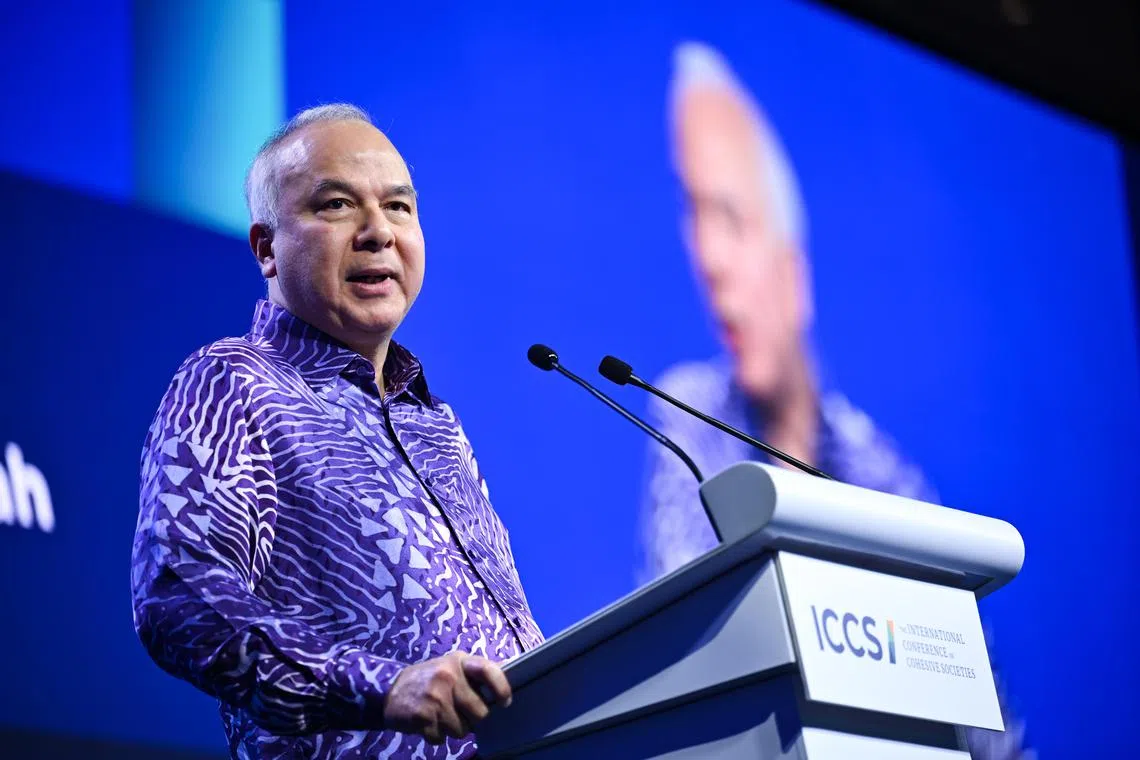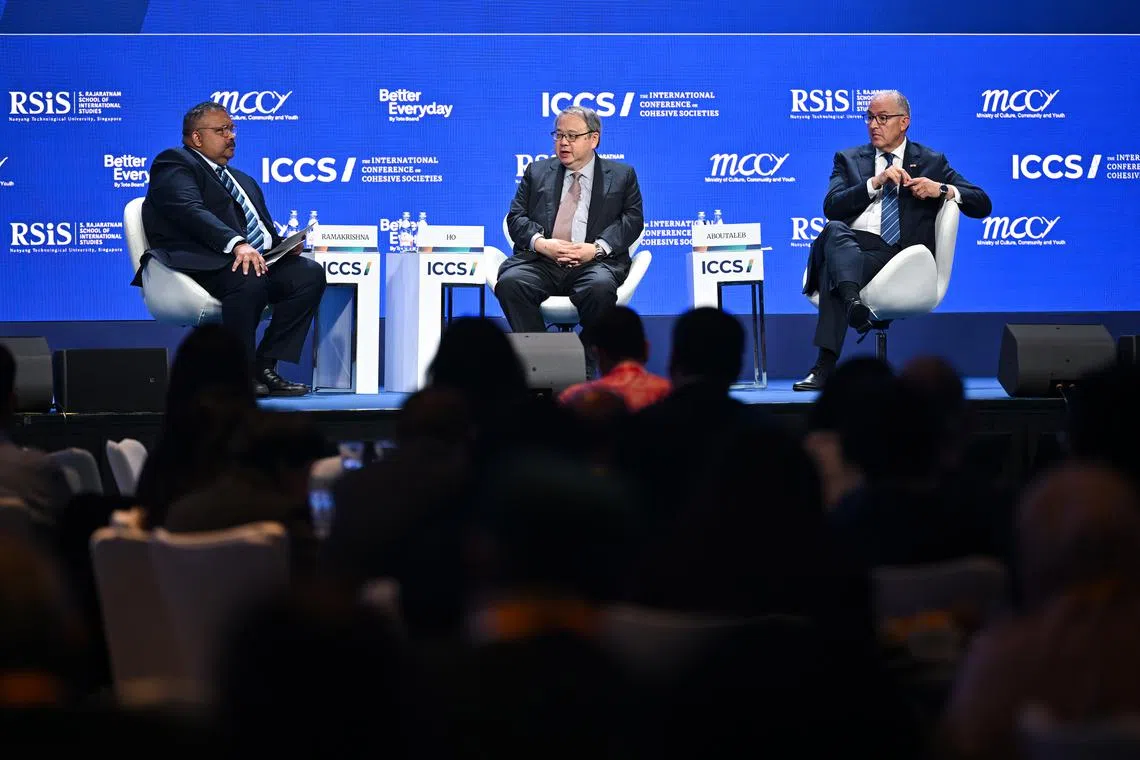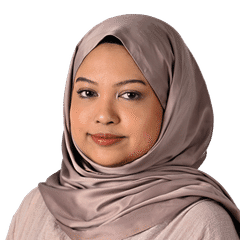New approaches needed to address accelerating digital change, say panellists
Sign up now: Get ST's newsletters delivered to your inbox

Perak Sultan Nazrin Shah delivering a keynote address during day two of the International Conference of Cohesive Societies at Raffles City Convention Centre on June 25.
ST PHOTO: LIM YAOHUI
SINGAPORE – Countries must find bold new ways to better manage their societies as they get continually transformed by technologies such as artificial intelligence (AI), a group of eminent speakers urged on June 25.
The need for agile and consultative governance is pressing as the benefits of digitalisation have unfortunately come at a considerable cost, such as the rise of digital echo chambers that feed prejudice and the propagation of extremist ideologies, said Perak Sultan Nazrin Shah.
Delivering the keynote speech on the second day of the annual International Conference of Cohesive Societies, the Sultan said digital transformation of society is one of three interlocking factors that have fuelled uncertainty and challenged social cohesion.
“Our digital spaces, which should be so good at opening doors and minds, are instead responsible for closing them,” he said.
“The very technologies that promise inclusion can entrench exclusion (while) our information ecosystems have become battlegrounds.”
The other two factors he cited are the unprecedented pace of international migration due to reasons such as climate change and political instability, and the rise in populism and protectionism caused by the unequal outcomes of globalisation.
At a discussion following the keynote, former civil service head Peter Ho noted how social media has dramatically weakened the ability of governments to regulate information flows, and that misinformation is outpacing the ability of states to correct it and control its impact.
He referenced a stabbing incident in Britain that claimed the lives of three young girls in 2024.
Far-right groups had stoked speculation online that the suspect was a Muslim migrant, despite the police clarifying that the attacker was born in Britain. This led to targeted attacks on the Muslim community, including a local mosque. Riots also erupted in 27 towns.
The incident highlighted the jurisdictional limitations countries have in regulating social media platforms with a global reach, said Mr Ho, who is now a senior adviser at the Centre for Strategic Futures think-tank.
It is a fool’s errand to think that governments alone can regulate technology that is changing so fast and impacting society, he added.
Fellow panellist Fadi Chehade, managing partner at investment firm Ethos Capital, sketched out three ways in which AI will only accelerate the reconfiguring of societies.
On the point of echo chambers, he noted that AI will only result in further hyper personalisation of digital content, which could further atomise communities.
The advent of AI also promises to multiply by millions of times the amount of misinformation that will be created, said the former president and chief executive of the Internet Corporation for Assigned Names and Numbers, a non-profit that coordinates the administration of the web’s protocols.
Lastly, the years ahead will see AI agents created at a pace that outnumbers the population of humans on the planet, dissolving the line separating the real world from cyberspace, he added.
“That’s the world we’re getting into, and I don’t think any of us – or any government, or any one institution – has the power to slow down the hybrid world we’re about to get into,” he said.

(From left) S. Rajaratnam School of International Studies dean Kumar Ramakrishna, Centre for Strategic Futures senior adviser Peter Ho and Rotterdam’s former mayor Ahmed Aboutaleb speaking at Plenary #2 on Navigating Uncertainty during day two of ICCS.
ST PHOTO: LIM YAOHUI
But rather than look at the future with gloom, the experts outlined ways in which countries can adapt to deal with the gathering pace of change.
Panellist Ahmed Aboutaleb, the former mayor of Rotterdam, recounted his experience building trust between government institutions and citizens, which involved the time-tested approach of spending many evenings and hours engaging in face-to-face dialogue to understand people’s needs and concerns.
“What people like is that the man or the woman in power gets to the level of the streets,” he said.
Mr Ho called for governments to have the humility to know they need to work closely with the private sector and the people sector, as it is through this “triangular relationship” that trust can be built up and consensus reached to tackle complex problems such as those brought about by technology.
Agreeing, Mr Chehade said these three groups working together can create a better form of multi-stakeholder governance. This is as the private sector would have to act within checks and balances, governments would not be imposing regulations that are out of sync with the digital world and civil society and people will have their voices heard, he said.
He also called for the legal concept of subsidiarity to apply to the governance of the digital world, meaning that regulations are shaped by each community based on its prevailing cultural norms, rather than for there to be universal standards imposed by distant authorities or bodies.
Sultan Nazrin said the temptation during times of such upheaval would be to look to familiar ways of doing things, but that doing so would be a mistake.
“There is a temptation to retreat – to retreat into narrower circles of identity, to hoard privileges and to romanticise a past that, if we are honest and stripped away nostalgia, never was,” he said.
Instead, he called for courage and clarity, which in the face of uncertainty “can become a valuable compass and a crucible for renewal”.
Quoting the philosopher Aristotle and singer Dolly Parton, the Sultan said: “You cannot change the wind, but you can adjust the sails.”



